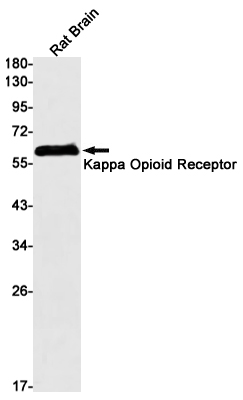
| WB | 1/500-1/1000 | Rat |
| IF | 1/20 | Rat |
| IHC | 咨询技术 | Rat |
| ICC | 技术咨询 | Rat |
| FCM | 咨询技术 | Rat |
| Elisa | 咨询技术 | Rat |
| Aliases | KOR; R21; KOR-1; MSL-1; Oprk2; K-OR-1 |
| Entrez GeneID | 18387 |
| WB Predicted band size | Calculated MW: 43 kDa; Observed MW: 60 kDa |
| Host/Isotype | Rabbit IgG |
| Antibody Type | Primary antibody |
| Storage | Store at 4°C short term. Aliquot and store at -20°C long term. Avoid freeze/thaw cycles. |
| Species Reactivity | Rat |
| Immunogen | A synthetic peptide of mouse Kappa Opioid Receptor |
| Formulation | Purified antibody in TBS with 0.05% sodium azide,0.05%BSA and 50% glycerol. |
+ +
以下是关于 κ-Opioid Receptor(KOR)抗体的3篇参考文献,按文献内容概括整理:
1. **"Characterization of a Novel Antibody for the κ-Opioid Receptor"**
- 作者:Al-Hasani, R. 等人
- 摘要:该研究开发并验证了一种高特异性的KOR抗体,通过免疫组化和Western blot技术证明其在啮齿类动物脑组织中的选择性结合能力,并用于探究KOR在中枢神经系统疼痛调节中的作用。
2. **"Selective Targeting of κ-Opioid Receptor in Peripheral Neurons Using Monoclonal Antibodies"**
- 作者:Schattauer, S.S. 等
- 摘要:文章报道了一种单克隆抗体,可特异性识别外周神经元中的KOR,通过免疫荧光和流式细胞术验证其灵敏度,并用于研究KOR在外周炎症性疼痛中的功能机制。
3. **"Validation of Commercial Antibodies for κ-Opioid Receptor Specificity in Human and Mouse Tissues"**
- 作者:Bruchas, M.R. 等
- 摘要:研究系统评估了多种市售KOR抗体的特异性,发现部分抗体存在非特异性结合问题,但通过基因敲除模型确认了其中两种抗体的可靠性,为后续研究提供了标准化实验方案。
以上文献均聚焦于KOR抗体的开发、验证或应用,涉及疼痛机制、受体分布及抗体特异性检测等方向。如需具体文献来源(期刊、年份),可进一步补充数据库检索信息。
The kappa opioid receptor (KOR), a member of the opioid receptor family (G protein-coupled receptors), is primarily involved in modulating pain perception, stress responses, and mood regulation. It binds endogenous ligands like dynorphins and synthetic compounds, mediating analgesia and dysphoria. KOR antibodies are essential tools for studying receptor localization, expression levels, and signaling mechanisms in tissues or cells. These antibodies are typically generated against specific epitopes of the receptor, such as extracellular loops or intracellular domains, and validated for applications like Western blotting, immunohistochemistry, or flow cytometry.
Research using KOR antibodies has revealed its distribution in the central nervous system (e.g., hippocampus, amygdala) and peripheral tissues, linking it to neurological disorders (e.g., addiction, depression) and chronic pain. Selective KOR antibodies help distinguish KOR from other opioid receptors (mu, delta), minimizing cross-reactivity—a critical factor given their structural similarities. Challenges include ensuring batch consistency and verifying specificity via knockout models or blocking peptides.
Recent interest in KOR-targeted therapies (e.g., biased agonists for pain management without side effects) underscores the antibody's role in drug development. However, species-specific variations (human vs. rodent KOR) require careful antibody selection. Overall, KOR antibodies remain pivotal in unraveling receptor biology and advancing precision medicine for opioid-related conditions.
×